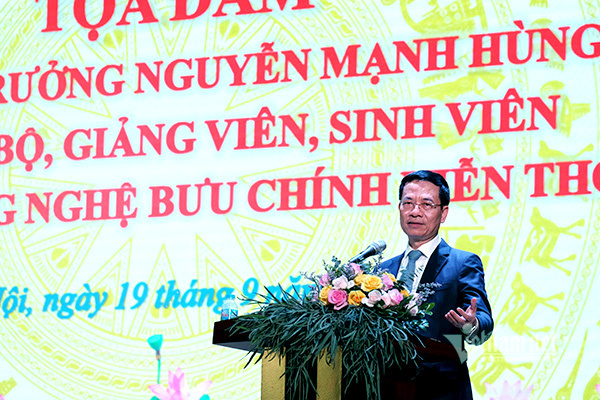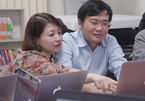At a meeting with students, lecturers and managerial officers from the Posts and Telecommunications Institute of Technology (PTIT), Hung encouraged creativity and innovation, saying that opportunities can only be embraced by a few pioneers.

Ministser of Information and Communication Nguyen Manh Hung
How to make a breakthrough
According to the minister, when talking about breakthroughs in tertiary education, one can use the phrase ‘do the opposite thing’.
‘Do the opposite thing’ means doing things differently from predecessors. This will create opportunities for successors.
The 4.0 industrial revolution is associated with ‘creative destruction’, which means destroying the old things and creating new things.
Those who have a magnificent past may not have the courage to destroy it. Meanwhile, those who have nothing or have little seem to have more opportunities.
Previously, universities concentrated on selecting the best students to train. But now, many universities focus on controlling the quality of graduates, while letting students themselves determine their studies.
Previously, universities only evaluated themselves. But nowadays, they have to compare themselves with other schools.
Therefore, issuing sets of criteria and comparing and assessing universities have special significance, which helps universities realize what they are weak at and find solutions to raise their ranking.
Previously, students studied first and worked later, and had to have textbooks when going to class. Now, they often do first and study later, while they go to lecture halls to learn what is not found in textbooks. Universities can use many 'unofficial' teachers to give lectures.
Previously, students would ask teachers if they did not know something. Now, they need to learn about things to know what to ask.
|
Every revolution only creates opportunities for a few countries to make a breakthrough to become developed countries, and for a few universities to become top-tier schools,” Ministser of Information and Communication Nguyen Manh Hung. |
Previously, universities focused on guiding students how to solve questions. But now, they teach how to find problems, which is more interesting.
Previously, teachers were those who taught students. Now, they act as trainers, while students are the major implementors and many are good instructors.
In the past, competing meant doing the same as others and trying to do better than others, though it was difficult to do this. Nowadays, competing means doing something differently, and it is the difference which distinguishes someone from others.
In the past, universities strived to become MIT (Massachusetts Institute of Technology), the leading US technology university, and it was a difficult task. But nowadays, they don't need to be MIT, and they use new technologies to do, teach and study differently.
There are still enterprises which need MIT graduates and employ them. But there will be enterprises which want non-MIT graduates, and they will find workers among PTIT graduates.
However, when doing things differently from MIT, one needs to do it in an excellent way.
Great opportunities to take lead in digital technology
Hung pointed out that PTIT has a great advantage: it belongs to a ministry of digital technology with 50,000 digital technology firms, with millions of workers and annual revenue of $100 billion.
The three firms in the school’s council, namely Viettel, VNPT (Vietnam Post and Telecommunication) and CMC, are the leading technology firms in Vietnam.
The university has a great opportunity to become the leading university in scientific research. A goal should be set that at least 25 percent of revenue of the institute is from research works.
Professors and associate professors of the institute must conduct research and spend at least 25 percent of their time on research.
“Miniature digital country’ to serve national digital transformation
Hung urged PTIT to become the leading university in Vietnam in training in digital technology to serve national digital transformation.
It needs to build digital platforms so that at least 70 percent of instructional content is posted on platforms. Teachers will focus on creating added value on the platform, or in other words, teachers will ‘stand’ on the platform to teach.
This is an open platform, integrated with the ‘elite’ and updated regularly.
One of the first things that needs to be done is turning the institute into a ‘miniature digital country’, where all the teachers’ and students’ activities will be carried out in the digital environment. Each teacher and student will have one digital identification number.
Regarding retraining and advanced training, demand is as high as demand for tertiary education. PTIT needs to set up a divison to satisfy demand. Massive Open Online Courses (MOOC) personalized for learners is one of the solutions.
If looking at the problem from this angle, the institute will be like a technology firm rather than a traditional school which focuses solely on teaching.
Sharing resources with enterprises
Most medium and large scale enterprises have their own training units with good facilities and equipment for practice. By cooperating with enterprises, universities will have facilities for teaching, and will not need to spend big money.
Thanh Hung

MIC enhances network security
The Ministry of Information and Communications (MIC) has launched the “Review and remove malware nationwide in 2020” campaign to enhance the country's network security.

Vietnam embraces digital transformation, online teaching in education sector
Thai Van Thanh, director of the Nghe An Education and Training Department, said if there are favorable conditions, online teaching will bring big benefits, especially in remote areas.